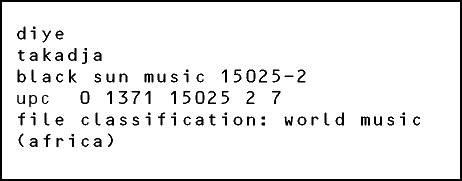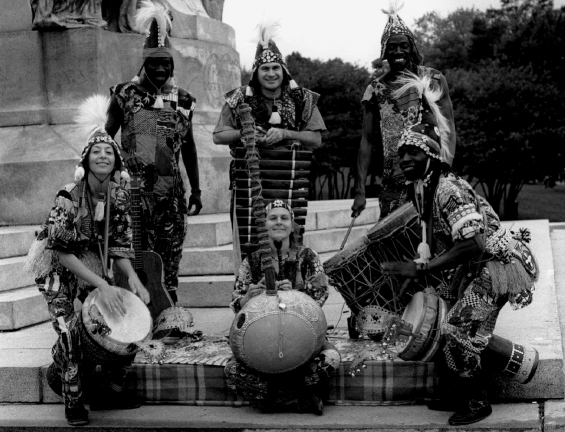|
|
|||||||||||||||||||||||||||||||||||||||
 
Diyé bedeutet Kinder. Die vor
Energie und Lebensfreude überbordende afrikanische
Musik ist allen Kindern der Welt (und denen in der Takadja-Gruppe)
gewidmet. Oumar N'Diaye u.a. singen spirituell ausgerichtete
Lieder aus Senegal und Guinea, begleitet von einem kunstvollen
Geflecht aus perkussiven Rhythmen.
the projectFans and critics alike will be delighted with the staying power of Takadja to continue their legacy of African music in the masterful style perfected by this multi-talented and ever-growing popular group. Takadja's self-titled debut album received the esteemed honor of Canada's JUNO Award for the Best Global Album of 1995. Diyé in the Sousou language means the children. Takadja dedicates this recording to the children of the world and especially to their own children, for they are our future. You can expect a vast array of rhythms covered in Diyé, such as Soli, Yolé, Koukou, Doundoumba and Mandianné rhythms from Guinea, N'Dorabine rhythm from Senegal (Woloff ethnic group), and a medley of various traditional rhythms originating from the Ivory Coast, such as Digba and Tiplo-Clalo rhythms from the Bété ethnic group, and Zaouli rhythm from the Gouro ethnic group. With all of the tracks composed by the members of Takadja, Diyé is a harmonious blend of the members ancestry, training and experiences, delivering a very personal message.
the artists |
| 1 | Diny'è | 4'46" |
| 2 | M'beguel | 4'20" |
| 3 | Siarré | 4'19" |
| 4 | Le Génie du Village | 6'27" |
| 5 | Sénoufo | 2'44" |
| 6 | Medley Ivoiren | 3'47" |
| 7 | Wami | 4'52" |
| 8 | Mam | 4'22" |
| 9 | M'bar - N'dorabine | 4'56" |
| 10 | Doumdoumfaré | 4'16" |
| 11 | Signokhora | 5'15" |
| 12 | Les Enfants Takadja | 3'12" |
| Total Time: | 53'47" |




